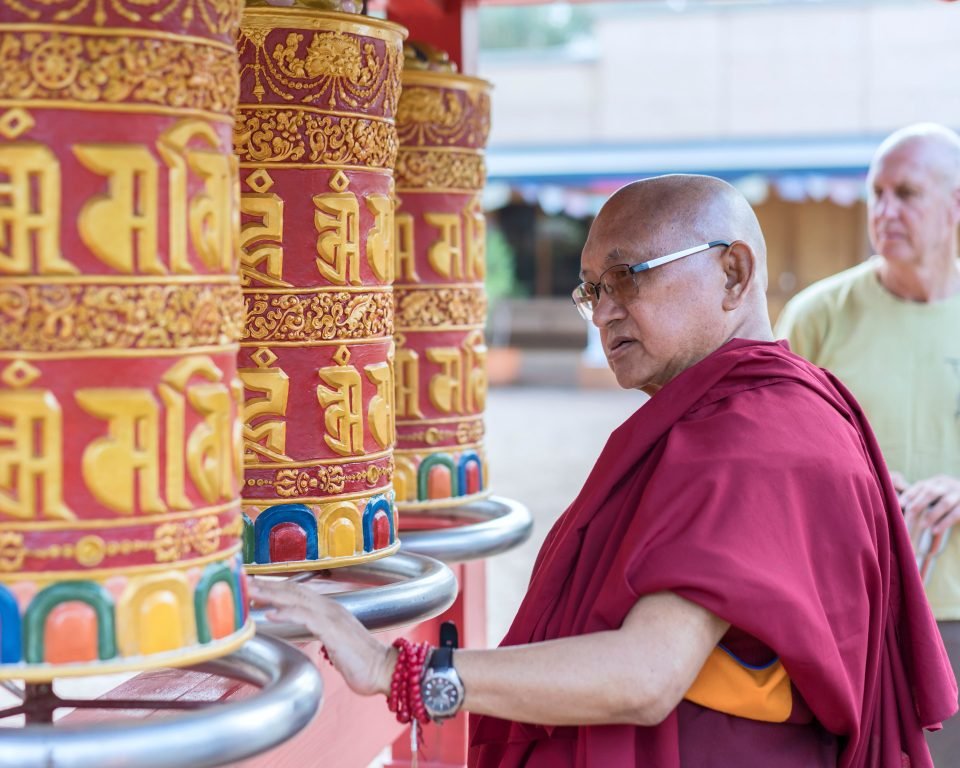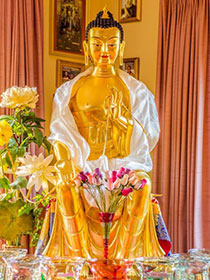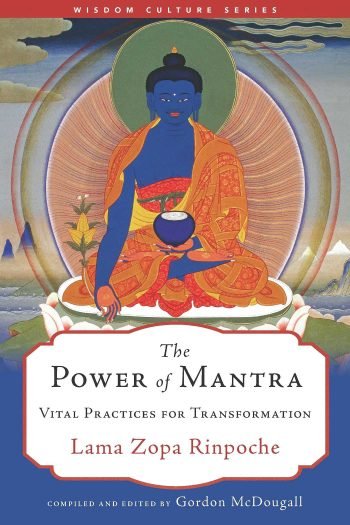- Home
- FPMT Homepage
Foundation for the Preservation of the Mahayana Tradition
The FPMT is an organization devoted to preserving and spreading Mahayana Buddhism worldwide by creating opportunities to listen, reflect, meditate, practice and actualize the unmistaken teachings of the Buddha and based on that experience spreading the Dharma to sentient beings. We provide integrated education through which people’s minds and hearts can be transformed into their highest potential for the benefit of others, inspired by an attitude of universal responsibility and service. We are committed to creating harmonious environments and helping all beings develop their full potential of infinite wisdom and compassion. Our organization is based on the Buddhist tradition of Lama Tsongkhapa of Tibet as taught to us by our founders Lama Thubten Yeshe and Lama Thubten Zopa Rinpoche.
- Willkommen
Die Stiftung zur Erhaltung der Mahayana Tradition (FPMT) ist eine Organisation, die sich weltweit für die Erhaltung und Verbreitung des Mahayana-Buddhismus einsetzt, indem sie Möglichkeiten schafft, den makellosen Lehren des Buddha zuzuhören, über sie zur reflektieren und zu meditieren und auf der Grundlage dieser Erfahrung das Dharma unter den Lebewesen zu verbreiten.
Wir bieten integrierte Schulungswege an, durch denen der Geist und das Herz der Menschen in ihr höchstes Potential verwandelt werden zum Wohl der anderen – inspiriert durch eine Haltung der universellen Verantwortung und dem Wunsch zu dienen. Wir haben uns verpflichtet, harmonische Umgebungen zu schaffen und allen Wesen zu helfen, ihr volles Potenzial unendlicher Weisheit und grenzenlosen Mitgefühls zu verwirklichen.
Unsere Organisation basiert auf der buddhistischen Tradition von Lama Tsongkhapa von Tibet, so wie sie uns von unseren Gründern Lama Thubten Yeshe und Lama Thubten Zopa Rinpoche gelehrt wird.
- Bienvenidos
La Fundación para la preservación de la tradición Mahayana (FPMT) es una organización que se dedica a preservar y difundir el budismo Mahayana en todo el mundo, creando oportunidades para escuchar, reflexionar, meditar, practicar y actualizar las enseñanzas inconfundibles de Buda y en base a esa experiencia difundir el Dharma a los seres.
Proporcionamos una educación integrada a través de la cual las mentes y los corazones de las personas se pueden transformar en su mayor potencial para el beneficio de los demás, inspirados por una actitud de responsabilidad y servicio universales. Estamos comprometidos a crear ambientes armoniosos y ayudar a todos los seres a desarrollar todo su potencial de infinita sabiduría y compasión.
Nuestra organización se basa en la tradición budista de Lama Tsongkhapa del Tíbet como nos lo enseñaron nuestros fundadores Lama Thubten Yeshe y Lama Zopa Rinpoche.
A continuación puede ver una lista de los centros y sus páginas web en su lengua preferida.
- Bienvenue
L’organisation de la FPMT a pour vocation la préservation et la diffusion du bouddhisme du mahayana dans le monde entier. Elle offre l’opportunité d’écouter, de réfléchir, de méditer, de pratiquer et de réaliser les enseignements excellents du Bouddha, pour ensuite transmettre le Dharma à tous les êtres. Nous proposons une formation intégrée grâce à laquelle le cœur et l’esprit de chacun peuvent accomplir leur potentiel le plus élevé pour le bien d’autrui, inspirés par le sens du service et une responsabilité universelle. Nous nous engageons à créer un environnement harmonieux et à aider tous les êtres à épanouir leur potentiel illimité de compassion et de sagesse. Notre organisation s’appuie sur la tradition guéloukpa de Lama Tsongkhapa du Tibet, telle qu’elle a été enseignée par nos fondateurs Lama Thoubtèn Yéshé et Lama Zopa Rinpoché.
Visitez le site de notre Editions Mahayana pour les traductions, conseils et nouvelles du Bureau international en français.
Voici une liste de centres et de leurs sites dans votre langue préférée
- Benvenuto
L’FPMT è un organizzazione il cui scopo è preservare e diffondere il Buddhismo Mahayana nel mondo, creando occasioni di ascolto, riflessione, meditazione e pratica dei perfetti insegnamenti del Buddha, al fine di attualizzare e diffondere il Dharma fra tutti gli esseri senzienti.
Offriamo un’educazione integrata, che può trasformare la mente e i cuori delle persone nel loro massimo potenziale, per il beneficio di tutti gli esseri, ispirati da un’attitudine di responsabilità universale e di servizio.
Il nostro obiettivo è quello di creare contesti armoniosi e aiutare tutti gli esseri a sviluppare in modo completo le proprie potenzialità di infinita saggezza e compassione.
La nostra organizzazione si basa sulla tradizione buddhista di Lama Tsongkhapa del Tibet, così come ci è stata insegnata dai nostri fondatori Lama Thubten Yeshe e Lama Zopa Rinpoche.
Di seguito potete trovare un elenco dei centri e dei loro siti nella lingua da voi prescelta.
- 欢迎 / 歡迎
简体中文
“护持大乘法脉基金会”( 英文简称:FPMT。全名:Foundation for the Preservation of the Mahayana Tradition) 是一个致力于护持和弘扬大乘佛法的国际佛教组织。我们提供听闻,思维,禅修,修行和实证佛陀无误教法的机会,以便让一切众生都能够享受佛法的指引和滋润。
我们全力创造和谐融洽的环境, 为人们提供解行并重的完整佛法教育,以便启发内在的环宇悲心及责任心,并开发内心所蕴藏的巨大潜能 — 无限的智慧与悲心 — 以便利益和服务一切有情。
FPMT的创办人是图腾耶喜喇嘛和喇嘛梭巴仁波切。我们所修习的是由两位上师所教导的,西藏喀巴大师的佛法传承。
繁體中文
護持大乘法脈基金會”( 英文簡稱:FPMT。全名:Found
ation for the Preservation of the Mahayana Tradition ) 是一個致力於護持和弘揚大乘佛法的國際佛教組織。我們提供聽聞, 思維,禪修,修行和實證佛陀無誤教法的機會,以便讓一切眾生都能 夠享受佛法的指引和滋潤。 我們全力創造和諧融洽的環境,
為人們提供解行並重的完整佛法教育,以便啟發內在的環宇悲心及責 任心,並開發內心所蘊藏的巨大潛能 — 無限的智慧與悲心 – – 以便利益和服務一切有情。 FPMT的創辦人是圖騰耶喜喇嘛和喇嘛梭巴仁波切。
我們所修習的是由兩位上師所教導的,西藏喀巴大師的佛法傳承。 察看道场信息:
- FPMT Homepage
- News/Media
-
- Study & Practice
-
-
- About FPMT Education Services
- Latest News
- Programs
- New to Buddhism?
- Buddhist Mind Science: Activating Your Potential
- Heart Advice for Death and Dying
- Discovering Buddhism
- Living in the Path
- Exploring Buddhism
- FPMT Basic Program
- FPMT Masters Program
- FPMT In-Depth Meditation Training
- Maitripa College
- Lotsawa Rinchen Zangpo Translator Program
- Universal Education for Compassion & Wisdom
- Online Learning Center
-
- Prayers & Practice Materials
- Overview of Prayers & Practices
- Full Catalogue of Prayers & Practice Materials
- Explore Popular Topics
- Benefiting Animals
- Chenrezig Resources
- Death & Dying Resources
- Lama Chopa (Guru Puja)
- Lama Zopa Rinpoche: Compendium of Precious Instructions
- Lama Zopa Rinpoche: Life Practice Advice
- Lama Zopa Rinpoche Practice Series
- Lamrim Resources
- Mantras
- Prayer Book Updates
- Purification Practices
- Sutras
- Thought Transformation (Lojong)
- Audio Materials
- Dharma Dates - Tibetan Calendar
- Translation Services
- Publishing Services
- Ways to Offer Support
- Prayers & Practice Materials
-
- Teachings and Advice
- Find Teachings and Advice
- Lama Zopa Rinpoche Advice Page
- Lama Zopa Rinpoche: Compendium of Precious Instructions
- Lama Zopa Rinpoche Video Teachings
- ༧སྐྱབས་རྗེ་བཟོད་པ་རིན་པོ་ཆེ་མཆོག་ནས་སྩལ་བའི་བཀའ་སློབ་བརྙན་འཕྲིན།
- Podcasts
- Lama Yeshe Wisdom Archive
- Buddhism FAQ
- Dharma for Young People
- Resources on Holy Objects
- Teachings and Advice
-
-
*If a menu item has a submenu clicking once will expand the menu clicking twice will open the page.
-
-
- Centers
-
- Teachers
-
- Projects
-
-
-
-
*If a menu item has a submenu clicking once will expand the menu clicking twice will open the page.
-
-
- FPMT
-
- Shop
-
-
-
The Foundation Store is FPMT’s online shop and features a vast selection of Buddhist study and practice materials written or recommended by our lineage gurus. These items include homestudy programs, prayers and practices in PDF or eBook format, materials for children, and other resources to support practitioners.
Items displayed in the shop are made available for Dharma practice and educational purposes, and never for the purpose of profiting from their sale. Please read FPMT Foundation Store Policy Regarding Dharma Items for more information.
-
-
26

Lama Zopa Rinpoche turning prayer wheels at Atisha Centre, Bendigo, Victoria, Australia, April 2018. Photo by Ven. Lobsang Sherab.
In the new book The Power of Mantra: Vital Practices for Transformation, Lama Zopa Rinpoche guides students through understanding the power and benefit of mantras. Rinpoche explains many popular mantras, giving specific instructions for practicing them, including Shakyamuni Buddha, Chenrezig, Manjushri, Tara, Medicine Buddha, Vajrasattva, and more. In an excerpt from the chapter on Chenrezig mantra, Rinpoche discusses the importance of OM MANI PADME HUM:
Compassion is not just for those with faith in the Buddha, Dharma, and Sangha. It is not just for those who are Buddhist, for those who seek enlightenment. Everyone needs compassion. No matter what style of life we have, the compassionate life is the best life. With that, our life is totally transformed. Before it was like kaka, but now it is transformed into gold. Before there was just ego, the self-cherishing mind, but now there is compassion. Compassion brings a huge difference in our life, like the difference between the earth and the sky.
Everybody needs to recite OM MANI PADME HUM to develop compassion. We are so fortunate that with our human body we are able to communicate and to chant Chenrezig’s mantra. Ants need to recite it, whales need to, monkeys need to, but they can’t.
In many areas in Tibet and Nepal, especially along trails, there are a lot of stupas and stones carved with the Chenrezig mantra. You can see big piles of these stones, called “mani stones,” as you leave the airport at Lukla [in Solu Khumbu, Nepal]. Sometimes a whole text, such as the Heart Sutra, is carved on a stone. One of my uncles, my teacher who first taught me the alphabet when I was four, carved mani stones like this. Because of the mantra’s great benefit, you can see it everywhere, adorning prayer flags and stones, and you can hear people reciting the mantra as they pass.
Just seeing mantras on stones purifies our obscurations by leaving impressions on the mind. As with prayer flags, when the wind touches these mantras and then touches a human being or animal, it purifies the negative karmas and obscurations of that sentient being.
Just like Westerners like to recite their mantra “Oh when can I be happy,” Tibetans like to recite OM MANI PADME HUM. They recite it while they are working, cooking, or doing any of the chores they need to do. When they are not serving customers, shopkeepers recite OM MANI PADME HUM. As they walk, Tibetans will invariably have a small prayer wheel full of mani mantras, which they spin clockwise as they recite.
Prayer wheels are my hobby; they offer so many benefits. The huge prayer wheels I ask the FPMT centers to build bless all the insects on the ground and in the area, besides all the people who turn them. They are such a great blessing for the area and a quick way to liberate sentient beings from the lower realms and enlighten them. Any person who circumambulates and turns the prayer wheel receives unbelievable purification. If a prayer wheel has one hundred million manis, one turn is equivalent to saying one hundred million OM MANI PADME HUM mantras.
And that is true even of the small, hand-held prayer wheels you always see Tibetans spinning as they walk. Because of methods such as microfiche printing, they can have millions of manis in a small wheel, so one turn creates incredible merit, no matter what they are doing. Reciting OM MANI PADME HUM makes the most mundane activity highly meaningful.
The old mothers in Solu Khumbu chant OM MANI PADME HUM so much. They have almost no intellectual understanding of the Dharma, and they can’t even understand it if a lama comes to teach, because he teaches in Tibetan, not Sherpa, the only language they speak. Being illiterate, they can’t even open a Dharma book and read it, and so they have no opportunity to learn the Dharma. But by reciting OM MANI PADME HUM, somehow their hearts become so much more compassionate. They may not understand why other beings are suffering so much, but they have a strong natural feeling of compassion for others and the wish to pray for them.
This was true of my mother, who would simply recite OM MANI PADME HUM when a lama was giving teachings. Because of reciting the mani mantra, she had a hundred thousand times more compassion than I have. I can read all the texts but still my compassion is like clouds in the sky: utterly unstable, never lasting. Just before she passed away, she told me that for most of her life she recited fifty thousand manis a day, but as she became older she was no longer able to do that many. Still, I am certain the great power of her compassion came from reciting OM MANI PADME HUM. It gave her a happy, meaningful life and a happy, meaningful death.
There is a tantra called Zung of the Eleven-Face Arya Avalokiteshvara. In it Chenrezig is said to mention,
By reciting my heart mantra, sentient beings receive the bodhisattvas’ holy deeds, the heart of all the Victors, called the heart of transcendental wisdom. In short, for sentient beings tormented by various sufferings, my heart mantra will abide and become a guide for them. Also, this heart mantra hooks the harm-givers, such as the flesh-eaters and other violent spirits, and causes them to generate loving-kindness and compassion. It then brings them to enlightenment.
Furthermore, he says,
Any sentient being who holds my name will abide in nonreturning. They will be completely liberated from all sicknesses and from all the defilements, all the vices collected with the body, speech, and mind.
It is not enough just to be able to say the words of the mantra; we should first cultivate as positive a motivation as we can—and the bodhichitta motivation is the best—and then recite it. Whoever recites the mantra with a bodhichitta motivation is somebody who really knows how to recite it. It is said in the teachings that the greater devotion we have for Chenrezig, the more power and benefit the mantra has.
From The Power of Mantra: Vital Practices for Transformation by Lama Zopa Rinpoche; compiled and edited by Gordon McDougall; published by Wisdom Publications (WisdomExperience.org), where you can order the paperback or digital versions of the book. You can also find the ebook and PDF version in the Foundation Store (shop.fpmt.org).
Visit the Foundation Store to also find a wide variety of Chenrezig practice materials. For more on mantras, see our Mantras page on FPMT.org.
Lama Zopa Rinpoche is the spiritual director of the Foundation for the Preservation of Mahayana Tradition (FPMT), a Tibetan Buddhist organization dedicated to the transmission of the Mahayana Buddhist tradition and values worldwide through teaching, meditation and community service.
- Tagged: mani, mani mantra, om mani padme hum
- Home
- News/Media
- Study & Practice
- About FPMT Education Services
- Latest News
- Programs
- New to Buddhism?
- Buddhist Mind Science: Activating Your Potential
- Heart Advice for Death and Dying
- Discovering Buddhism
- Living in the Path
- Exploring Buddhism
- FPMT Basic Program
- FPMT Masters Program
- FPMT In-Depth Meditation Training
- Maitripa College
- Lotsawa Rinchen Zangpo Translator Program
- Universal Education for Compassion & Wisdom
- Online Learning Center
- Prayers & Practice Materials
- Overview of Prayers & Practices
- Full Catalogue of Prayers & Practice Materials
- Explore Popular Topics
- Benefiting Animals
- Chenrezig Resources
- Death & Dying Resources
- Lama Chopa (Guru Puja)
- Lama Zopa Rinpoche: Compendium of Precious Instructions
- Lama Zopa Rinpoche: Life Practice Advice
- Lama Zopa Rinpoche Practice Series
- Lamrim Resources
- Mantras
- Prayer Book Updates
- Purification Practices
- Sutras
- Thought Transformation (Lojong)
- Audio Materials
- Dharma Dates – Tibetan Calendar
- Translation Services
- Publishing Services
- Teachings and Advice
- Find Teachings and Advice
- Lama Zopa Rinpoche Advice Page
- Lama Zopa Rinpoche: Compendium of Precious Instructions
- Lama Zopa Rinpoche Video Teachings
- ༧སྐྱབས་རྗེ་བཟོད་པ་རིན་པོ་ཆེ་མཆོག་ནས་སྩལ་བའི་བཀའ་སློབ་བརྙན་འཕྲིན།
- Podcasts
- Lama Yeshe Wisdom Archive
- Buddhism FAQ
- Dharma for Young People
- Resources on Holy Objects
- Ways to Offer Support
- Centers
- Affiliates Area
- Teachers
- Projects
- Charitable Projects
- Make a Donation
- Applying for Grants
- News about Projects
- Other Projects within FPMT
- Support International Office
- Projects Photo Galleries
- Give Where Most Needed
- FPMT
- Shop
Translate*
*powered by Google TranslateTranslation of pages on fpmt.org is performed by Google Translate, a third party service which FPMT has no control over. The service provides automated computer translations that are only an approximation of the websites' original content. The translations should not be considered exact and only used as a rough guide.Your whole life is controlled by karma, you live within the energy field of karma. Your energy interacts with another energy, then another, and another. That’s how your entire life unfolds. Physically, mentally, it’s all karma.









